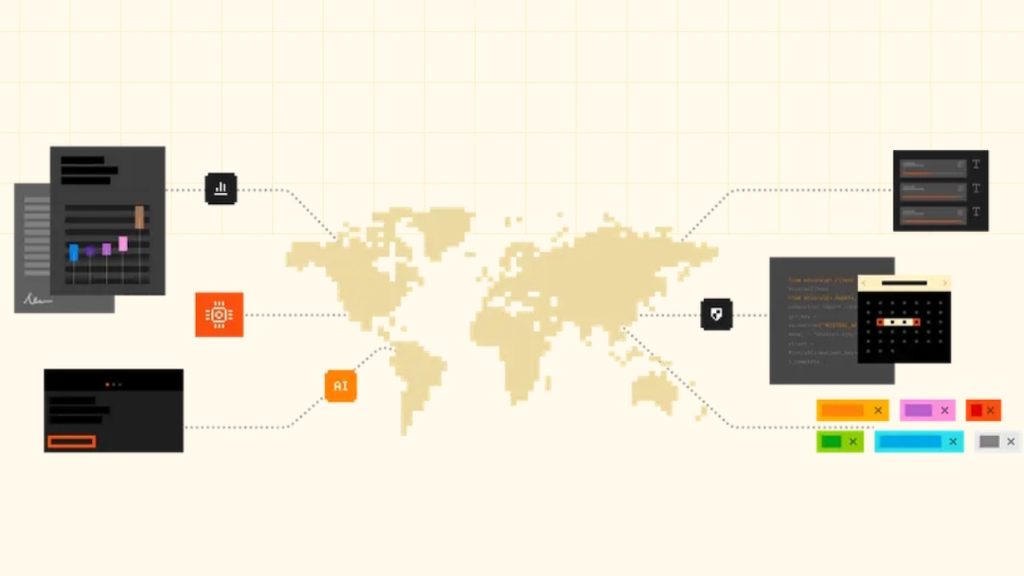European AI lab Mistral AI has launched “AI for Citizens,” a strategic initiative to help governments and public institutions build their own sovereign AI solutions. The program provides a direct alternative to the “one-size-fits-all” approach of dominant, non-European tech giants like Google, Meta, and Microsoft.
Mistral aims to give nations control over their technological future by offering flexible, secure, and transparent AI. This allows them to transform public services, ensure data privacy, and foster local innovation. The company is already working with several countries, putting its vision of placing its motto “frontier AI in your hands” into practice for the public sector.
Challenging the ‘One-Size-Fits-All’ AI Model
In its announcement, Mistral directly confronts the risks public institutions face when relying on closed, foreign AI systems. The company argues that such dependence can lead to monopolistic vendor lock-in, geopolitical vulnerability, and a critical loss of data sovereignty.
The risks extend beyond security. Relying on external platforms can stifle local innovation ecosystems and result in significant economic value being transferred to foreign players. Furthermore, models trained on generic global data often fail to grasp local cultural, linguistic, and legal subtleties.
Mistral’s initiative lands at a crucial moment, as European leaders and businesses debate the implementation of the EU AI Act. Its focus on sovereign, transparent systems aligns with the continent’s broader push for digital autonomy and regulatory oversight of powerful technologies.
This move offers an alternative grounded in openness, collaboration, and choice, a philosophy that has defined its strategy since its inception. The initiative aims to challenge to the handful of corporations that currently dominate the AI landscape.
A Blueprint for Sovereign Public Sector AI
The “AI for Citizens” initiative provides a concrete framework for governments and offers a full portfolio of technologies, from top-tier models to developer tools, with flexible deployment options. Nations can choose self-hosting for full control or use partner-operated data centers.
A cornerstone of the program is bespoke research and development. Mistral offers to co-train models to meet local language, cultural, and use-case needs to ensure that the AI aligns with unique national priorities, rather than reflecting the biases of a foreign training environment.
This customization goes deeper than simple translation and involves tuning models to understand specific legal frameworks, public service protocols, and cultural contexts, making themeffective for tasks like assisting civil servants or interacting with citizens in a locally appropriate manner.
Governments can also leverage Mistral’s wider toolkit to build end-to-end solutions. For example, its high-performance OCR API could digitize government archives, while its Agents API could power sophisticated internal assistants for public workers.
From Theory to Practice: Global Government Partnerships
Mistral highlights its existing partnerships with public sector bodies across the globe as evidence of the program’s viability and impact.
The Government of Luxembourg, for instance, which has partnered with Mistral to bolster technological innovation and integrate AI into its armed forces stated, “This partnership is a crucial step in our strategy to make Luxembourg a world leader in the sovereign data economy. European-style artificial intelligence with a Luxembourg touch,” underscoring the strategic importance of the collaboration especially inside Europe.
Similarly, the Republic of Armenia is leveraging the partnership to revolutionize its public and private sectors. Mkhitar Hayrapetyan, the Minister of High-Tech Industry, said, “Our partnership with Mistral AI marks an important step in Armenia’s journey to develop AI solutions that support both our citizens and public institutions,” emphasizing the goal of improving government efficiency and accessibility.
In its home country of France, Mistral is working with the national employment agency, France Travail, and equipping thousands of civil servants with its Le Chat assistant. It also has a strategic partnership with the French Ministry of Defense. The agency’s CEO, Bertrand Rondepierre, noted, “We are proud to announce our strategic partnership with Mistral AI. This collaboration will enable us to develop state of the art AI solutions to the unique needs of our defense sector.”
The collaborations also extend to defense and security across Europe. A partnership with German drone specialist Helsing aims to develop next-generation AI for European defense. Helsing’s Chief Scientist, Antoine Bordes, explained, “Europe’s defence must be built on technologies we understand, trust, and control. Helsing’s collaboration with Mistral reflects a shared commitment to advancing AI capabilities that serve that mission.” Further partnerships exist with Singapore’s defense and home affairs agencies and the University of Groningen in the Netherlands.
A Strategic Play for European Tech Autonomy
This initiative is the latest step in Mistral’s aggressive strategy to build a comprehensive AI platform. It follows the recent launches of its Magistral reasoning models and a sophisticated Agents API for developers, which are designed to create a robust ecosystem.
The company has consistently balanced its enterprise ambitions with a commitment to the open-source community, releasing powerful yet efficient models like Mistral Small 3.1. This dual approach has helped it build a loyal developer following while securing major enterprise and government contracts.
Mistral’s strategy serves as a key competitive advantage. The open models build trust and a wide user base, while the proprietary, high-performance offerings provide the security and customization that large organizations and governments require for sensitive applications.
Having raised over $1.1 billion and with a potential IPO on the horizon, Mistral is solidifying its position as a key independent player. CEO Arthur Mensch has repeatedly emphasized the company’s independent streak, famously stating in an interview, “We are not for sale.”
For government partners, this independence is a critical assurance. It signals long-term stability and a commitment to its stated mission, free from the strategic pivots that could follow an acquisition by a larger tech conglomerate with different priorities. With “AI for Citizens”, Mistral reinforces this vision.

